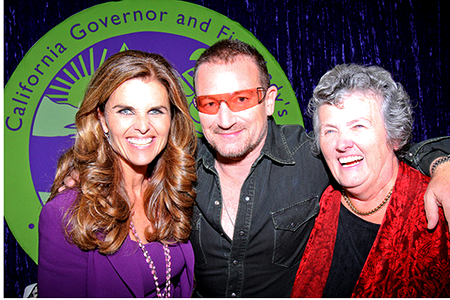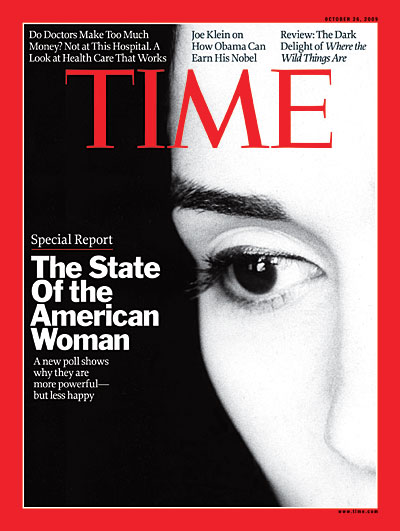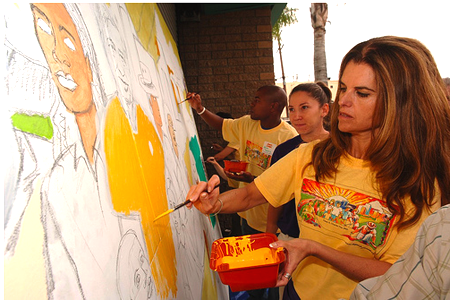The Women's Revolution in America: Maria Shriver Tells Us 'What's Up'
/One might believe it’s ‘American Women Week’ with the story on TIME magazine’s cover and NBC’s extensive coverage of the Shriver Reprort, “A Woman’s Nation Changes Everything”, a focus at the changing nature of women’s roles in society, coproduced with The Center for American Progress and available at A Woman’s Nation website.
The purpose of The Shriver Report argues that America finds itself in a transformational moment but relies on traditional assumptions and institutional visions in its interpretation of the realities and implications of Woman’s Nation.
A core assumption in both The Shriver Report and this week’s TIME magazine is that the real battle of the sexes is over. This is my personal belief as well, which is not to suggest that serious challenges don’t remain.
The Rockefeller/Time nationwide poll, conducted in early September as the chapters of the report were being finalized, finds that the battle of the sexes is over and is replaced by negotiations between the sexes about work, family, household responsibilities, child care, and elder care. Executive Summary, The Shriver Report
 Maria Shriver, Bono, Sister Joan Chittister at 2008 Women’s ConferenceA major focus of “A Woman’s Nation” concerns children: who’s responsible for child rearing? The impressive rise in hours allocated to parenting by men — especially fathers under 40 — confirms that men have assumed a host of new obligations as dads. They also do lots more housework, even though women are loathe to admit it.
Maria Shriver, Bono, Sister Joan Chittister at 2008 Women’s ConferenceA major focus of “A Woman’s Nation” concerns children: who’s responsible for child rearing? The impressive rise in hours allocated to parenting by men — especially fathers under 40 — confirms that men have assumed a host of new obligations as dads. They also do lots more housework, even though women are loathe to admit it.
I repeat that American institutions, especially the workplace, continue to make parenting a stressful challenge for both women and men. The Shriver Reports digs deep into this reality, and so will we.
NBC is running a series all week on ‘woman’s nation’ with extensive coverage on both the Today Show and also the NBC Evening news. We’ll pull all the information and analysis together into a Hot Topics journal page.
 Over at TIME magazine, we have a special report: The State of the American Woman, creating more context around this same topic.
Over at TIME magazine, we have a special report: The State of the American Woman, creating more context around this same topic.
The impact of the recession on women’s earnings is contradictory to other reports out this week, one’s that argue that men’s earliings have been hit harder by the recession.
TIME considers today’s woman against the backdrop of a their 1972 issue devoted to “A New Woman”.
TIME wrote in 1972, in describing the ‘New Woman’: As often as not, the New Woman was a masculine fantasy—Greta Garbo as a Soviet virago, titillatingly mannish yet secretly craving French perfume and Melvyn Douglas. Such, at least, was popular mythology—women, even in their supposed emancipation, have often been, as it were, prisoners of the male imagination. Always there was the secret, insistent vibration of sex: rebellion ends when Rhett Butler kicks down the door.
The challenge of the last 40 years concerns American women creating her own self, in her own image of what women should be like in America.
In reality, American woman — compared to French women — still don’t possess the same confidence. Our involvement in polics is less than for European women. Our Anne of Carversville focus won’t be only on American women, but how we line up compared with other women in the world.
As Shriver reminds us, it’s been a good long while since we dug deeply into women’s lives in America, examining them through a fresh and global lens.
Maria Shriver Honors Cesar E. Chavez
 First Lady MARIA SHRIVER and CaliforniaVolunteers launch effort to build community playspaces that honor Cesar E.Chavez at the Watts Labor Community Action Committee in South Los Angeles. March 24, 2007 via Flickr’s photoman4yourIn America, which has no social network for families — that would be socialism and a big no-no — we’ll learn how other countries handle similar parenting challenges.
First Lady MARIA SHRIVER and CaliforniaVolunteers launch effort to build community playspaces that honor Cesar E.Chavez at the Watts Labor Community Action Committee in South Los Angeles. March 24, 2007 via Flickr’s photoman4yourIn America, which has no social network for families — that would be socialism and a big no-no — we’ll learn how other countries handle similar parenting challenges.
Check us out in Hot Topics. I sense The Shriver Report and all the TV coverage around it will unleash a torrent of new analysis and opinions. And I’ve written quite a lot on this topic in the last two years. Those articles will also be pulled together, in an effort to create a central place for looking at American women and men together and from multiple angles. Anne
























































